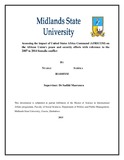Please use this identifier to cite or link to this item:
https://cris.library.msu.ac.zw//handle/11408/2430Full metadata record
| DC Field | Value | Language |
|---|---|---|
| dc.contributor.author | Sabeka, Nyarai | - |
| dc.date.accessioned | 2017-06-30T13:29:42Z | - |
| dc.date.available | 2017-06-30T13:29:42Z | - |
| dc.date.issued | 2015 | - |
| dc.identifier.uri | http://hdl.handle.net/11408/2430 | - |
| dc.description.abstract | The AU in its 50 th Anniversary Solemn Declaration pledged not to bequeath to future generations of Africans a legacy of wars and guns by silencing the guns by 2020. Since then the AU through its guiding principle of “African Solutions to African Problems” has made significant strides to enhance peace and security on the continent. In Somalia, the AU through AMISOM has shown that it is capable of conducting a successful peacekeeping operation as evidenced by the political and security developments in Somalia namely the inauguration of a new Federal Parliament and the swearing in of Hassan Sheik Mohammad as President in 2012. However, AMISOM like all other AU PSOs continues to be plagued by lack of military resources, adequate funding and institutional capacity to manage its operations. As a result, the AU through Article 17 (4) of the PSC made a provision to cooperate and work closely with international partners on issues of peace, security and stability in Africa. Moreover, the African Peace and Security Architecture (APSA) which has developed since 2002 also provides a vision framework for African and external partnership. In that regard, the AU has engaged international partners including the USA to enhance continental peace and security and also deal with humanitarian and developmental challenges facing Africa. Meanwhile, to ensure better engagement with Africa, in 2007 then USA President George W. Bush announced that his country was creating a military command whose central focus was Africa the US Africa Command. However, the idea of a foreign military command in Africa has been met with resistance from most African states who argue such a development could undermine all the achievements made by the AU throughout the years. Considering the progress made by AMISOM in Somalia there are concerns that AFRICOM’s involvement in the country could undermine the AU’s peace and security efforts in helping resolve the conflict. Against this background, this study seeks to assess the impact of US African Command (AFRICOM) on the AU’s peace and security efforts with reference to the 2007 to 2014 Somalia conflict. | en_US |
| dc.language.iso | en | en_US |
| dc.subject | United States Africa Command | en_US |
| dc.title | Assessing the impact of United States Africa Command (AFRICOM) on the African Union’s peace and security efforts with reference to the 2007 to 2014 Somalia conflict | en_US |
| item.languageiso639-1 | en | - |
| item.grantfulltext | open | - |
| item.fulltext | With Fulltext | - |
| Appears in Collections: | Bachelor Of Science In Politics And Public Management Honours Degree | |
Files in This Item:
| File | Description | Size | Format | |
|---|---|---|---|---|
| SABEKA,N.pdf | Full Text | 1.3 MB | Adobe PDF |  View/Open |
Page view(s)
108
checked on Jan 20, 2026
Download(s)
64
checked on Jan 20, 2026
Google ScholarTM
Check
Items in MSUIR are protected by copyright, with all rights reserved, unless otherwise indicated.



